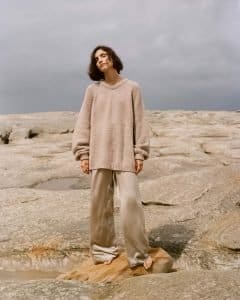For the founders of Wolfgang Scout – Carla Woidt, Marianne Horton and Natalie Wood – extensive experience in the fashion and design industry is exactly what brought the three together to create a knitwear brand that does things a little differently in order to do them right.
“I have worked in the fashion & apparel industry for a long time and I’ve always worked in the design and development area of the business and have had a lot to do with textiles,” says Woidt.
Woidt and Horton know each other from university. While Woidt is a seasoned design and product expert with almost two decades of international experience in luxury fashion, working with brands like Theory, Helmut Lang and Temperley, Horton is a textile designer who considers herself a ‘textile artist and maker’. Meanwhile, Wood is a design director and a well-respected creative force within the Australian fashion industry, having worked for names such as Veronika Maine and Country Road.
“In the last 10 years, the premise of sustainability has been elevated, and businesses both large and small have been trying to work out how to shift into that sustainable sphere. Considering that we’re an industry that has a big impact on the environment globally, I started to look more at the origin of fibres, which brought me full circle to Australian merino wool.”
Woidt describes this journey as ‘full circle’ because her father is in fact a shearer. Having grown up around wool, she has always had a keen interest and appreciation for the commodity. She says: “I love the properties of wool. I love the diversity of what you can do with it, there’s just so much richness about it. But whenever I would talk to people about hand-knitted products, they would complain about the scratchiness of it.”
She thus decided that she wanted to celebrate and showcase what Australian merino wool could be, other than just being the fibre of choice for fine suiting; all the while considering how to protect the product with regard to developing a traceable and sustainable supply chain.

The plan is to expand the company’s reach to the northern hemisphere
At this point, Woidt and Horton set out to develop a superior micron merino Australian wool yarn that could be used to create luxury hand-knitted garments. First, they found an RWS-certified grower in Victoria, who ticked the boxes for land and animal welfare. A scourer who doesn’t use chemicals was next located. Now, the challenge was to track down a spinner who could produce the unique yarn they were after; something that proved much more difficult.
“Unfortunately, Australia does not have the skills or machines to create the yarn we wanted spun. So, we went to New Zealand and found a mill and technician there. At first, they said that what we wanted couldn’t be done, but we asked them to give it a go and they managed to work through it.”
This perseverance paid off. And now this unique development of a superior micron merino wool yarn is at the heart of the business. The yarn is something that exemplifies the quality of the raw material and celebrates wool in its purest form.
The founders ‘crazily decided’ to manage the whole chain themselves, which means that the dyeing process also needed organising. This is often one of the most polluting stages of the supply chain due to the high water usage and chemical treatments, so Wolfgang Scout wanted to make sure this was managed correctly. Now, all of the brand’s wool is hand dyed in Australia, using non-hazardous, low impact dyes. This process is mainly carried out by Horton, who Woidt says ‘is an absolute machine and a colour expert’.
To make the final product, the company endeavoured to find hand knitters. Again, it tried to find people locally, but this isn’t something really within the Australian skillset. It then found an Australian-based organisation called Koco Knits: a B Corp-certified company that teaches women in India to knit, giving them a source of income.
“All of this planning was two years in development and then we were ready to launch,” says Woidt.
The brand works with Australian-based organisation Koco Knits to hand knit the garments.
Today, Wolfgang Scout offers classic and timeless pieces such as raglan sweaters in a gentle colour palette, knitted tank tops and cardigans, all of which have been curated to last and to be treated well by customers. And although the company’s USP is using merino wool, not everything in the collection derives from this – the brand also offers some silk and linen pieces, too.

“I’m very creative on one side and practical on the other,” she explains. “We wanted to elevate the knitwear, so it sits in a certain sphere. We also work with silk – another protein fibre that can be dyed with the same methods.”
The company also sells the merino yarn through its website. Woidt says that they want people to know where the product comes from as it’s not just a sweater, there’s a story behind it. She says: “From my previous experience, when we have incorporated traceability and there’s a story and richness behind a product, there’s an absolute engagement that is different to any other product.”
The plan is to better explain this story in future, too. The brand is currently working on collating all details, such as the name of the grower, spinner and knitter, so that customers can know exactly who is behind their chosen piece.
For Wolfgang Scout, there is even more to do moving forward. Not only is the company considering expanding into other natural fibres such as Australian cotton, but it will be expanding its market base to the northern hemisphere.
Owen , J. (2020, June 9). Showcase of Australian merino wool through its sustainably crafted, luxury knitwear. Retrieved from https://www.wtin.com/article/2020/june/080620/knitwear-label-pushes-boundaries-of-merino-and-sustainability/?channelid=1123

